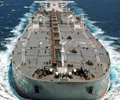|
|
 -->
The world’s five biggest oil-tanker companies will still travel to the ports of Tokyo Bay, joining other shipping lines in judging them safe for crew
-->
The world’s five biggest oil-tanker companies will still travel to the ports of Tokyo Bay, joining other shipping lines in judging them safe for crew
and vessels.Mitsui O.S.K. Lines Ltd., Frontline Ltd., Teekay Corp., Nippon Yusen Kaisha and NITC Co., whose ships can hold enough oil to supply Japan for 100 days, all said there is no disruption to their services. All vessels are avoiding a 30-mile exclusion zone around the crippled Fukushima Dai-Ichi nuclear plant, about 220 miles to the north of Tokyo.
Record-high readings of con**inated sea water were found yesterday near the plant, which was damaged by a magnitude-9 earthquake and 23-foot tsunami on March 11, Japan’s Nuclear and Industrial Safety Agency said today. The International Maritime Organization, a United Nations agency, said on March 21 there was no medical basis for restricting shipping and the U.S. Navy said March 28 any radiation on vessels can be scrubbed off with soap and water and isn’t harmful to people’s health.
“The isotopes in question have a very short lifespan, so owners are probably not yet concerned about the effects of going into Tokyo Bay,” said Petter Narvestad, a shipping analyst at Fondsfinans AS in Oslo. “Should the radiation spread, that may change the picture.”
The Baltic and International Maritime Council, representing two-thirds of the world’s merchant fleet, said March 28 it had not been informed that any shipping line was avoiding Japan because of the threat of radiation. Japan has more than 200 commercial ports.
Liberian Registry
The Liberian Registry, which represents about 11 percent of the world’s merchant fleet, lifted its recommendation that ships stay 100 nautical miles away from a section of Japan’s east coast. Captains should now follow the guidance of the Japanese government, which is to stay 30 kilometers (19 miles) away from the Fukushima plant, the registry said in a March 25 notice.
The U.S. Coast Guard advised all ships to stay 50 miles away from the Fukushima plant, the U.S. Department of Transportation said in a notice March 18. Any U.S.-bound ship passing through this limit should submit the information to the U.S. Coast Guard, according to the notice.
Shipping lines sailing into nuclear zones are not insured if their crew or vessels are affected by radiation, according to information on the weBSIte of the U.K. P&I Club, which insures a fleet drawn from more than 50 nations.
Government Agencies
While Teekay ships are calling at Tokyo Bay, the company is taking the advice of government agencies and taking vessels outside the exclusion zone to the north, Graham Westgarth, president of Teekay Marine Services, said by e-mail yesterday. The Hamilton, Bermuda-based company is the third-largest tanker operator, according to Clarkson Research Services Ltd., a unit of the world’s biggest shipbroker.
Iran’s NITC Co. will accept bookings to Tokyo, Chartering Manager Nasrollah Sardashti said by e-mail from Tehran yesterday. NITC is the fifth-largest owner, according to data from Clarkson Research Services.
Mitsui O.S.K., Frontline, Teekay, NYK and NITC have a combined carrying capacity of about 65 million deadweight tons, according to Clarkson. That’s equal to about 477 million barrels. Japan’s oil consumption averaged 4.4 million barrels a day in 2009, according to data from BP Plc.
There were 66 oil ports and terminals operating normally in Japan as of March 29, with five closed and three partially open, according to Inchcape Shipping Services, which handles as many as 4,000 port calls in Japan every year.
Management Unit
Frontline, based in Hamilton, Bermuda, and the biggest supertanker operator, is only avoiding the exclusion zone around Fukushima, Jens Martin Jensen, Singapore-based chief executive officer of the company’s management unit, said in an e-mail yesterday.
NYK, Japan’s largest shipping line by sales, maintained normal shipping services for liquefied-natural gas, oil or dry bulk commodities, Jun Katayama, a spokesman, said by phone yesterday. Mitsui O.S.K., operator of the world’s largest merchant fleet, has also made no changes to its services in LNG, oil and bulk shipping, according to Eiko Mizuno, a spokeswoman.
Tokyo Bay ports are safe and don’t pose a safety threat, Andrew Linington, a spokesman for Nautilus, Europe’s largest union for shipping officers, said March 23. The union took advice from the U.K.’s Maritime and Coastguard Agency.
The situation in tankers is similar to that in container shipping, where five of the six largest owners are maintaining services to Tokyo Bay. The fourth biggest, Hapag-Lloyd AG, is diverting vessels to docks in the south of the country.
Mediterranean Shipping
A.P. Moeller-Maersk A/S, Mediterranean Shipping Co. and CMA CGM SA, the three biggest container shipping lines, said they are maintaining routes to Tokyo and Yokohama, Japan’s two busiest container ports. Evergreen Marine Corp., the fifth- largest container line, is serving Tokyo and Yokohama as usual, and Neptune Orient Lines Ltd.’s APL unit, the sixth-biggest, is doing so for Yokohama.
welcome to www.eshiptrading.com |
|